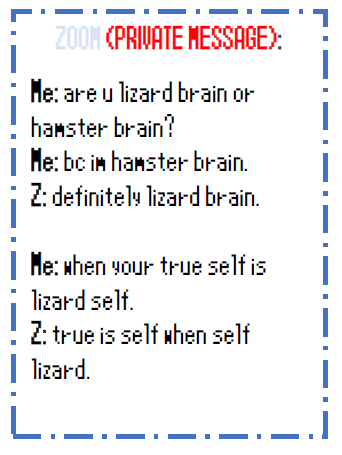
THOUGHTBANK: plain-spoken with violent verbs / code-switching / identity / notes / journals / short sentences / languages / body / sailor moon / concrete + specific words / performing parts-of-speech surgery / eloquence disease / action vs passive / language of animacy / erasure / stream-of-preordained-consciousness
❀
Sometimes, the thesis to my writing comes down to look as pretty as 花火。The kanji for flower and fire. Hanabi. Fireworks. I want my writing to be as pretty as fireworks and as hazardous as the ones that burnt my father’s face in the rice fields.
❀
One time, I smoked a joint and the cinders kissed my eyelid. When the burn scabbed up, it camouflaged with the freckles. Burn or freckle?
❀
Question: What’s a sentence without its head?
❀
A workshop comment: “[…] Do you want the non-Vietnamese speaking reader to see it and experience it visually but not fully understand the content? If it’s not the latter…”
Constantly firing neurons. Constantly sending languages and translating. Constantly code-switching. Why should I grate my flesh so a reader feels included? ERROR: DENDRITES AREN’T CONNECTING.
For once, brand “other” onto your forehead. Let the singed flesh remind you of my alienation. Remind you of what I do for most writing: Google, translate, redefine. My identity is not a visual aesthetic. I’m not bleaching my skin for you. Burn yours.
I seek to alienate a majority. I seek to other the reader.
a violent and defiant act.
❀
What does a voice do? What is that?
❀
![]()
Q: WHAT DOES IT MEAN TO BE A VIETNAMESE AMERICAN WRITER?
ORAL ANSWER: THAT’S ALL I KNOW. ISN’T THAT THE ONLY WAY TO GO?
WRITTEN ANSWER: Eloquence is not my forte. I still have problems speaking to anyone without the sickness strumming my voice chords. Anxiety in speaking. Fear in the wrong word choice. An oral conversation is a reactive response. I mastered mutilation as a reactive response.
I razor blade my writing because I don’t have proficiency in any language.
❀
At battles, the dancer doesn’t choose their songs. The DJ chooses. If you’re lucky, you’ll know the song. If not, hit the beat. Have a concept in mind. Think fast. Respond and react. You have 60-90 seconds to prove you deserve to move on. Think fast. Respond. React.
❀
Craig Santos Perez’s from – Evening will Come. How Guåhan is erased. The discussion of erasure. How do I sharpie a language I could possibly lose? How do I permanent? How do I write a language I desperately cling onto? Practice in writing. Practice in identity. Practice in cyphers & labbing. Practice in tiếng Việt.
❀
When you learn a language, you learn the culture. The language of animacy beats within each word. I keep my culture beating with every sentence I write. The hierarchy, the history, the bloodline of the Fairy and the Dragon singed in each letter.
❀
Marinate me in nước măm. Cover me in rice flour. Fry me. Rip my flesh with your canines. Take in the aroma. Gobble my organs. Devour my Vietnamese.
❀
I’m intensely attracted to A Bestiary by Lily Hoang. Constantly amused by the zodiac animal constraint. How each braid is intertwined with delicacy. Constantly piecing section after section. I wish I could write like Lily. God, I wish I was as cool as Lily.


[ C H A L L E N G I N G T E X T S ]
Aime Cesaire’s The Notebook of the Return to The Native Land & Michael Palmer’s The Danish Notebook
• The notebook as a genre and how often notes only make sense to the note taker.
• Cesaire’s automatic and surrealistic writing, how many citations one must read, so much research to do.
• “WHAT DO YOU MEAN PALMER REWROTE AND REARRANGED HIS NOTES?” – Me when Kazim ruined my notebook fantasies.
o Can it be considered a notebook if the notes aren’t real?
o Can it be considered a notebook if they’re edited?
o notes = intentional.
Myung Mi Kim’s Commons
FOR MY MOTHER PIECES.
• How the brain continuously likes to make relationships based on the proximity of the text.
• The practice of romanization, mixtures of documents, motifs.
• What is considered fragment vs what is considered the whole narrative?
• What work does Pollen Fossil Record do? Why was this necessary? Is it ever necessary to decode something for a reader?
![]()
• “Each page has its own logic.” – Editor during Round One of Edits for “Insecurities.”
• Wendy’s C. Ortiz’s Bruja: is there a logic? Why isn’t blond indexed?
o Always an action, always doing something.
o Dream journals are dope.
• Chen Chen once tweeted you can like a piece because it sounds beautiful.
![]()
Theresa Hak Kyung Cha’s Dictee
Claudia Rankine’s Don’t Let me be Lonely
Notes: shorthand & require rewriting in different colors. What do you want to remember? Fast, to the point, catch onto the next person’s thoughts. Keep writing b4 the nxt ppl spk.
Writing: Bridging identities. Bridging how identity works in writing. Extrapolate the notes. Extrapolate the journal entries. Extrapolate and beautify because memory is imperfect.
❀
Short and simple sentences because I want the concrete and specific. It’s easier to decapitate shorter sentences into meaning. It’s easier to beat a short sentence to bend to your wants and desires. Short sentences because I can only respond in short sentences in different languages.
❀
I want my writing to be an experience. I want to keep people off-guard. I want to be like Jeff Dahmer. Em muốn giết người. I want to burn their flesh. Cho em ăn bạn yêu. I want to airfry their livers. Many more fragments. Mutilate sentences.
❀
WORKSHOP COMMENT FOR PG.2: “But as a reader, this page made me want to stop reading. I have to work too hard to interpret it.”
explanation: see page one, fragment five.
WORKSHOP COMMENT: “This is all in your head. Let me in.”
note: I’m not letting anyone stab their swords
into my membrane. I puncture yours.
WORKSHOP COMMENT: “If you want to be published… If you want an audience…This is a piece of art.”
note: They’re notes. Why should I let anyone into
my brain? You aren’t entitled to my thoughts. I’m
the bujo bitch. I adore my notes.
My notes aren’t art. They’re notes. I long for the day when I don’t have to point to the burn people mistake as a freckle. I am not going to crème brulee my face so someone who reads my notes, my secrets, decides my burns are freckles.
❀
ANSWER: a body. Can you imagine what the sentence means without a head? What it looks like?
My undergraduate professor often told me I liked to circle around the subject like a dragon to a tower. I guess this is another way of saying that.
❀
“For a very long time everybody refuses and then almost without a pause almost everybody accepts.” (Stein 4)
My identity and form work in tangent. If I continue to circle the tower, how long will it be before my wings become tired? How long will I fly until the reader shoots the wings? Until they surrender because they have to “work too hard?” Until the writing has no point? Until I crash onto the concrete? Something that is different, something that is initially rejected, style and grammar. Grammar and style, form as something unusual. Peculiarities as beauty. How long will it take to be accepted before I bleed to death?
❀
Amy Tan’s “Ghosts” challenged my ideas of short sentences. Tan wrote clear subject verb sentences that phantomed. “Ghosts” managed to be ambiguous while still using simple sentences. How does one do that? How do you phantom readers with such succinctness? I wanna do that too.
❀
I struggle to write long sentences because so many of these modifiers seem unnecessary, obsolete, and destructive to my mind. I don’t like fluff. I don’t like long and flowy sentences, I like sharp and dangerous. Stick words into the sentences’ sternums and twist them so fuckinggood until they cry red.
❀
Cyphers are vital in the dance scene. You can’t replicate the same energy and atmosphere. It’s an exchange of colors. Once that moment passes, you only hear about it in stories. You can never replicate a cypher.
❀

❀
Proofreading out loud is my favorite revision. It’s one of the few times I accept my voice instead of threading my lips with fishing line.
❀
Struggled to think about passive voice. I still think about what the reader should focus on with passive voice.
❀
Active voice: I want to be front and center. I desire to be the champion. Because my identity, because of Vietnamese American, because of gender, because of straight-coding, because because because I’m supposed to be in the background, for once, I crave to be the hero, to torture those who thought I needed to blend. No, I skewer lungs and boil intestines. I blender assumptions.
❀
Two as an accident. Tu as an accident. Alissa Tu as an annihilating accident.
❀
My writing is like my father’s hands. They’re calloused. Broken down from years of gardening and hammering calcium in his phalanges. I hold my father’s hands because they are a constant comfort. A constant comfort I’d like to saw and resin into a locket.
Contributor’s Bio
Alissa Tu is a Vietnamese-American writer born in Olympia, Washington while residing in San Diego, California. Her work can be found in The Margins, Bittermelon Poetry’s “Stay at Home Diary,” and Loud Coffee Press. When she’s not being a graduate student, she’s perfecting her match lighting skills.


